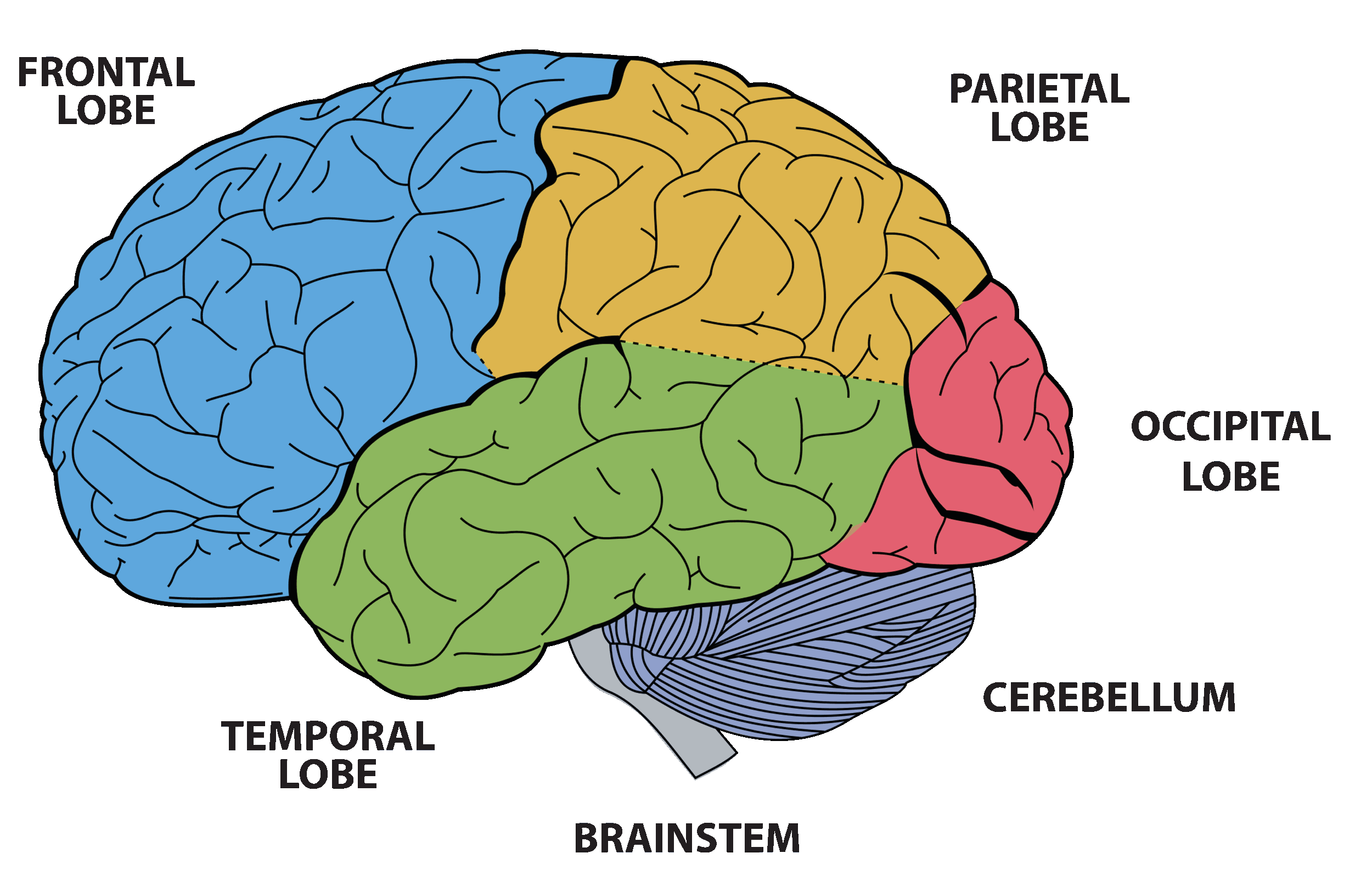Cerebral Cortex
Frontal Lobe, Parietal Lobes, Occipital Lobes, Temporal Lobes.

Frontal Lobe
Functions
- How we know what we are doing within our environment (Consciousness)
- How we initiate activity in response to our environment
- Judgments we make about what occurs in our daily activities
- Controls our emotional response
- Controls our expressive language
- Assigns meaning to the words we choose
- Involves word associations
- Memory for habits and for motor activities
Possible Consequences of Injury
- Loss of simple movement of various body parts (Paralysis)
- Inability to plan a sequence of complex movements needed to complete multi-stepped tasks, such as making coffee (Sequencing)
- Loss of spontaneity in interacting with others
- Loss of flexibility in thinking
- Persistence of a single thought (Perseveration)
- Inability to focus on task (Attending)
- Mood changes (Emotionally Labile)
- Changes in social behaviour
- Changes in personality
- Difficulty with problem-solving
- Inability to express language (Broca’s Aphasia)
Parietal Lobe
Functions
- Visual attention
- Touch perception
- Goal-directed voluntary movements
- Manipulation of objects
- Integration of different senses, allowing for understanding a single concept
Possible Consequences of Injury
- Inability to attend to more than one object at a time
- Inability to name an object (Anomia)
- Inability to locate the words for writing (Agraphia)
- Problems with reading (Alexia)
- Difficulty with drawing objects
- Difficulty in distinguishing Left from Right
- Difficulty with doing mathematics (Dyscalculia)
- Lack of awareness of certain body parts and/or surrounding space (Apraxia), what leads to difficulties in self-care
- Inability to focus visual attention
- Difficulties with eye and hand coordination
These difficulties may or may not appear and if they do, can present to varying degrees.
Occipital Lobe
Functions
- Vision
Possible Consequences of Injury
- Defects in vision (Visual Field Cuts)
- Difficulty with locating objects in the environment
Sometimes (But Rarely) Associated With The Following:
- Difficulty with identifying colours (Color Agnosia)
- Production of hallucinations
- Visual illusions – inaccurately seeing objects
- Word blindness – inability to recognize words
- Difficulty in recognizing drawn objects
- Difficulties with reading and writing
- Inability to recognize the movement of an object (Movement Agnosia)
These difficulties may or may not appear and if they do, can present to varying degrees.
Temporal Lobe
Functions
- Hearing ability
- Acquisition of memory
- Some visual perceptions
- Categorization of objects
Possible Consequences of Injury
- Difficulty in recognizing faces (Prosopagnosia)
- Difficulty in understanding spoken words (Wernicke’s Aphasia)
- Disturbance with selective attention to what we see and hear
- Difficulty with identification of, and verbalization about, objects.
- Short-term memory loss
- Interference with long-term memory
- Inability to categorize objects (Categorization)
These difficulties may or may not appear and if they do, can present to varying degrees.
Cerebellum
Functions
- Coordination of voluntary movement
- Balance and equilibrium
- Some memory for reflex motor acts
Possible Consequences of Injury
- Loss of ability to coordinate fine movements
- Loss of ability to walk
- Inability to reach out and grab objects
- Tremors
- Dizziness (Vertigo)
- Slurred Speech (Scanning Speech)
- Inability to make rapid movements
These difficulties may or may not appear and if they do, can present to varying degrees.
Brain Stem
Functions
- Breathing
- Heart Rate
- Swallowing
- Reflexes to seeing and hearing (Startle Response)
- Controls sweating, blood pressure, digestion, temperature (Autonomic Nervous System)
- Affects level of alertness
- Ability to sleep
- Sense of balance (Vestibular Function)
Possible Consequences of Injury
- Decreased vital capacity in breathing, important for speech
- Swallowing food and water (Dysphagia)
- Problems with balance and movement
- Dizziness and nausea (Vertigo)
- Sleeping difficulties (e.g., Insomnia, sleep apnea)
These difficulties may or may not appear and if they do, can present to varying degrees.
Anyone in B.C. with questions about a child or youth with brain injuries is welcome to call our information line.
Lower Mainland : 604.451.5511 or Toll Free : 1.877.451.5511. 
COMMUNITY BRAIN INJURY
ABOUT CBIPCY
Who Are We
Program Staff
RESOURCES
Brain Injuries
Brain Functions
Concussions
For Families
For Youth
Downloads & Links

